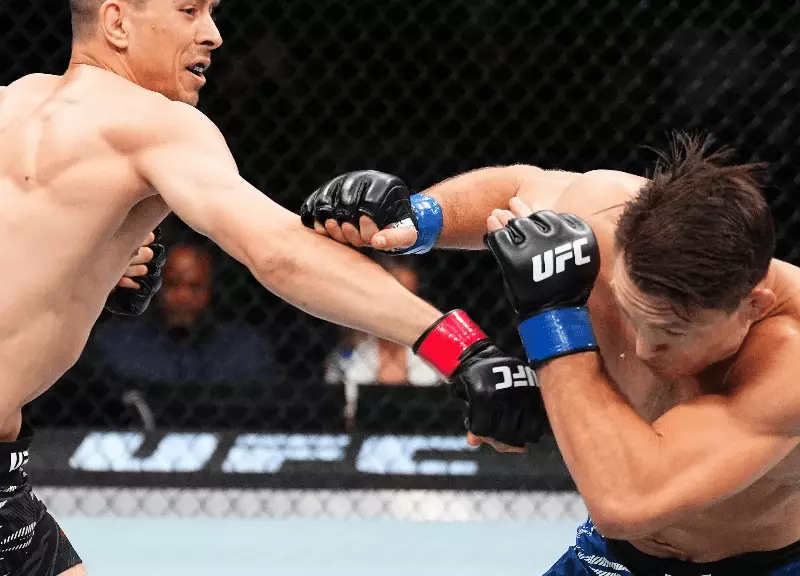Mixed martial arts (MMA) is a sport heralded for its unpredictability and intense physical encounters. Each strike, grappling maneuver, and submission attempt can spin the tide of a fight in mere seconds. Yet, as exciting as this spectacle may be, it poses inherent risks to the fighters involved. Referees play a critical role in maintaining fairness and safety inside the cage, often facing scrutiny over their decisions. Recent events at UFC on ESPN 64 spotlighted this contentious issue, particularly highlighting referee Mike Beltran’s handling of the fight between Manuel Torres and Drew Dober.
The fight’s co-main event boasted an exhilarating start, with Torres showcasing his striking prowess. However, as the bout progressed to its abrupt end in Round 1, the question arose: Did the referee intervene at the correct moment? John McCarthy, a venerable figure in MMA officiating, openly criticized the timing of the stoppage, pointing out that Dober took excessive punishment while failing to intelligently defend himself. This incident not only raises concerns about fighter safety but also illuminates the subjective nature of refereeing decisions.
The Thin Line Between Entertainment and Safety
Referees like Beltran operate on the borderline of entertainment and fighter safety. Their role extends beyond merely officiating; they are tasked with protecting the health of the athletes while ensuring an exciting experience for the audience. In Dober’s case, he found himself on the receiving end of a relentless assault after being knocked down. Despite the inherent excitement surrounding MMA, the protection of fighters must be paramount.
McCarthy’s evaluation introduces a critical nuance to the discussion about stoppage timing. He emphasizes that while every second counts in the fight, the need to ascertain a fighter’s capability to defend adequately is vital. Dober was caught in an untenable position, absorbing a barrage of hammerfists—a punch considered less glamorous than a traditional strike but nonetheless dangerous. McCarthy’s insights illustrate the vital importance of understanding the impact of strikes and the toll they take on the fighter’s ability to respond.
Lessons from the Octagon: Accountability in Refereeing
Referees, while human and prone to error, must maintain accountability in their decision-making. During the fight, Beltran appeared to waver in his judgment—he stepped in but hesitated, ultimately allowing Dober to absorb more punishment than necessary. The aftermath of such decisions has significant implications, especially in light of Dober’s three consecutive losses and his public reflections on the pressure of competition. His experience underscores the emotional and psychological aspects that accompany strenuous career paths in MMA, further amplifying the impact of fight stoppages.
Dober’s candid social media responses reveal an athlete attempting to balance disappointment with reality. Acknowledging his defeats while expressing gratitude for his health and family shows a grounded perspective, yet it raises further questions. What happens when fighters become overly focused on their careers at the expense of their well-being? This dynamic can perpetuate a cycle of damage that compromises fighter safety and longevity.
Fighter Influence: The Call for Enhanced Protections
As athletes like Dober navigate the ups and downs of their careers, the conversation around the responsibility of fighters themselves cannot be overlooked. Although referees are responsible for stopping fights, fighters must also prioritize their safety. The culture of toughness can inadvertently push fighters to downplay their vulnerabilities, risking long-term consequences.
With the rising emphasis on fighter health, organizations and regulatory bodies need to innovate beyond traditional protocols. Incorporating enhanced training for referees alongside open discussions on fight stoppage criteria and athlete health could foster a safer environment. Reinforcing the importance of fighter welfare and establishing clearer guidelines would mitigate the ambiguity that currently clouds officiating decisions.
MMA lives and breathes on the excitement it brings to fans, but the fighters sacrifice their well-being for every moment of adrenaline. As discussions continue about fight stoppages, it is crucial to center these conversations around safeguarding both athletes’ integrity and the sport’s future. Only then can MMA evolve into a more compassionate arena, wherein the thrill of victory does not eclipse the inherent value of safety and health.

